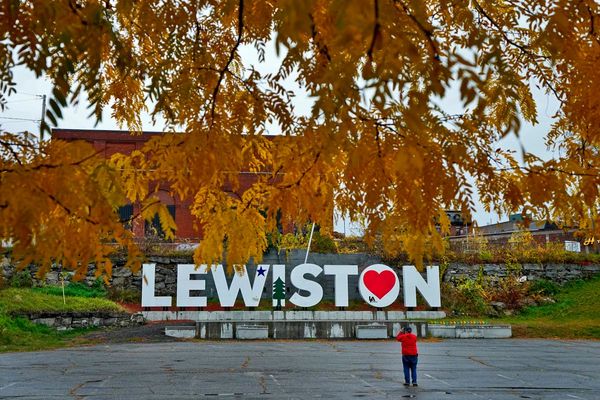
It isn’t the tumbling, 360-degree views of San Andreas that command our undivided attention from the top of Mount Chiliad. Nor is it the whir of the cable cars. And it’s not the blanket of mist that engulfs the valley below, nor the implacable sunrise that invades every inch of the towering cliffside’s crevices and chasms.
At 2,619 feet above sea level, our group of five is hanging on every word of Craig (not his real name), an unassuming Grand Theft Auto V role-player, as he shares a personal tale about his mother’s alcoholism, how she was knocked down and killed as she left her local pub one evening and how he has struggled with depression and anxiety ever since.
Contrasting with the themes of virtual violence and crime associated with Grand Theft Auto, Craig is part of a group that uses the game’s long-established but still ever-growing PC role-playing scene as a safe space for discussing mental health.
“My mother chose alcohol over her own wellbeing, and her family’s, too,” says Craig. “She had taken the separation from my dad pretty bad, and starting drinking a lot. My sister and I put it down to her way of dealing with the breakup, and, because she didn’t appear to be drinking in the house or at work, we failed to notice it becoming a serious problem.”

Grand Theft Auto V launched on consoles in late 2013 and arrived on PC in April 2015. Role-play servers on the latter platform, where players act out characters of their own invention in-game, followed shortly after. Today, despite its age, the crime simulator’s role-play scene is thriving. My mountaintop encounter with Craig and his friends takes place in one of FiveM’s servers – a bustling 32-person open source modification that lets users work, live and socialise by virtue of jobs, amenities and voice chat. Players are expected to live as they would in the real world and obey laws that are enforced by voluntary police and emergency service role-players in turn.
Here, on this server, players enter Rockstar North’s satirical swipe at modern America to try to pursue an honest in-game living, reflective of reality, that eschews the exaggerated chaos that is the open-world game’s default state.
This isn’t to say virtual crimes don’t occur within the Los Santos role-play experience – far from it – but voice chat combined with a less crime-centred world provides scope for more nuanced encounters, such as the pseudo self-help group I’ve happened upon.
“I’ll never forget the night we received the call,” says Craig. “Mum had staggered out of the pub and was knocked down by a bus. She was pronounced dead at the scene, and that really triggered my own depression and anxiety. It’s been three years and I’ve been to counselling, had cognitive behavioural therapy and now I’m on a course of antidepressants. I’m not 100%, but I’m getting there.”
When we reach the foot of the mountain, I thank the group for letting me tag along, and Craig specifically, for sharing something so personal and sensitive. The group’s members part ways but not before informing me they gather every few weeks for similar meetings and that I’d be more than welcome to join in again.

I take note of the group’s individual player tags and agree to catch up soon. In a world designed to inspire theft, murder, drug dealing and general bad behaviour, there’s something beautifully incongruous about what this group is doing in San Andreas, the game’s imitative slant on Los Angeles, which serves to underscore the unconventional and idiosyncratic nature of the Grand Theft Auto V role-play scene.
Weeks pass before I spot Craig online again, this time with a few familiar and some less recognisable faces at Legion Square, the server’s meeting hub. I’m welcomed warmly and we walk for a while with no obvious destination, eventually following the train tracks that run between the Port of Los Santos and Vespucci Beach. Along the way, a man named David openly discusses his real-life gambling problems.
It’s all relayed within the guise of role-play, but David tells the group that at its worst, his addiction led him to money from his closest friends, and that his gambling spread to everything from football coupons to darts and horse racing, winnings from which he’d use to purchase Shark Cards – in-game money for Grand Theft Auto Online. As we circle back into town, the group commends David for having joined a Gamblers Anonymous group.
Later, a woman named Christine pulls up to Legion Square in a battered motorhome and suggests a camping trip to Vinewood Hills. Six of us set off, and with the sun setting over Blaine County and the stars now dancing over the Los Santos city skyline, Christine chats about drug use. Her brother-in-law committed suicide a number of years ago, she tells us, and she’s since spent much time stifling feelings of grief, loss and subsequent family dysfunction with recreational, drug-fuelled binges that temporarily help, but ultimately accentuate her suicidal thoughts.
Christine doesn’t consider herself a drug addict but recognises she’s doing more harm than good to her mental state and self-esteem. Like the others, Christine’s admissions are raw, heartfelt and relatable.

Weeks later, I rejoin the group at a house party-style get-together in an area of South Los Santos named Strawberry. There are more new faces, and as I work the room introducing myself, they chat about sports, video games, family pets and other interests.
After a while, Craig asks whether I fancy sharing anything personal of my own, and I oblige. I’m suddenly very aware of the intimacy forged by the compact setting, as the party-goers fall silent and turn their attention to me. I tell the group about my uncle’s suicide in 2008 and the impact this had on my family and my mental health. I speak of how I went to Australia for a couple of years with my girlfriend to escape how I was feeling at the time, but that my depression and anxiety was awaited me on my return.
I explain how it took me a year and a half to acknowledge the problem before visiting a doctor, and a further two years to pursue counselling and a course of medication.
While I believe that mental health issues should always be addressed by qualified professionals, I find the experience of relaying my innermost feelings to strangers helpful and in many ways, cathartic. As I speak, the group rallies around me with words of encouragement and gratitude, and I’m reminded that video games are uniquely placed to help people explore the kind of sensitive and interpersonal issues that can be hard to face up to in real life.
The stories in this article were shared with the consent of those involved. Names have been changed.







